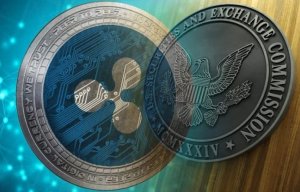SEC v. Ripple: SEC finds Ripple’s argument “ironic”
“Defendants are left to argue that Director Hinman was not a high-ranking government official. This is ironic.”

The Securities and Exchange Commission has filed a reply in further support to its motion to quash the defendants’s deposition subpoena aimed at ex-SEC Director William Hinman.
In other words, the SEC wants its former official out of the lawsuit while Ripple Labs and its co-founder believe a lot can be learned from Mr. Hinman’s testimony.
William Hinman has been under much scrutiny since the US financial watchdog came forth with its complaint against Ripple for its role in publicly addressing calls for clarity regarding the status of Bitcoin and Ethereum.
Who is the ex-SEC Director whose deposition the SEC wants to quash?
Although the SEC states his words were no “official determination”, the crypto industry and markets reacted to his authoritative opinion. Ripple even pointed that out in its opposition to quash the deposition subpoena:
He “himself described the speech as newsworthy. And those watching and listening agreed. The price of ether skyrocketed immediately after the speech”.
“Many have since described the speech as setting forth a new standard separate from, or additional to, Howey. Multiple currency exchanges decided to list XRP after the speech, suggesting it gave comfort that offers and sales of XRP did not run afoul of the securities laws.”
That’s what the SEC found ironic. In its first motion to quash, the regulator reminded the court and the defendants that high-ranking government officials require the high burden of exceptional circumstances to be summoned for deposition.
Ripple didn’t contest that but argued that Mr. Hinman “never was a high-ranking official” while having a unique, first-hand knowledge relevant to the claims and defenses in the case. The SEC replied:
“Defendants are left to argue that Director Hinman was not a high-ranking government official. This is ironic. Director Hinman is the SEC official whose personal opinions about Ether were viewed as “newsworthy” and, Defendants claim, caused a spike in the price of Ether and led to speculation about the future viability of the Howey standard and the legal status of XRP.
“Moreover, Defendants cannot point to a single case where the deposition of an SEC official of Director Hinman’s rank was allowed, nor can they distinguish the many cases where courts quashed the depositions of other similarly-ranked officials”, the letter continued, adding that defendants are thus asking the court to make new law only to ask him about external meetings and internal SEC deliberations that are privileged.
So, the SEC reiterates that the ex-SEC Director was a high-ranking official and Ripple can’t say otherwise. In addition, the regulator argues that he has no unique knowledge of any discoverable facts.
About Mr. Hinman’s speech on the regulatory status of Ether under the US securities law, it was no official determination by the SEC and Ripple does not dispute that, the regulator said.
The ex-SEC Director has been the target of conflict of interest claims for his role in stating that Ether was no security despite its fundraiser in 2014 and then moving to a law firm with direct links to the Ethereum Foundation.
The Ripple lawsuit has added pressure on the SEC to provide regulatory clarity and its ex-officials have been under the spotlight for their professional moves, including ex-SEC Chair Jay Clayton.
This could lead the current administration to be more specific and official about Bitcoin and Ether. And now that the upcoming Ethereum 2.0 upgrade will change the model from a proof of work to proof of stake, ETH2 may be seen more like a security than ever before. At least, according to attorney Jeremy Hogan’s analysis.
You might also want to read:
Will the Ripple lawsuit turn against Ethereum with the SEC revisiting its status?
SEC v. Ripple: Why is the lawsuit taking so long?
Can the Ripple lawsuit turn against Ethereum?









